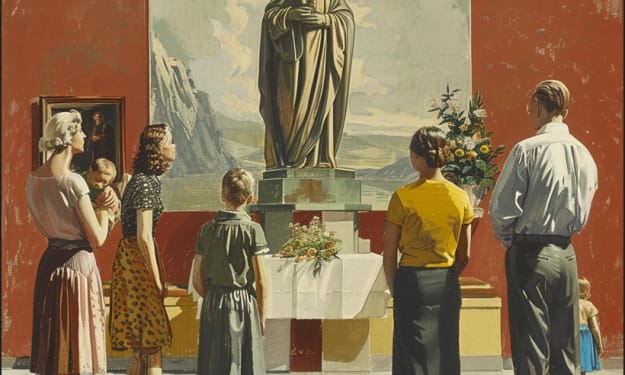Eternally Burdened Soul
What Forever Changed My Life

This content has undergone editing and critique with the assistance of artificial intelligence (AI) tools.
One singular event in my life will forever be a haunting presence, an indelible memory that lingers until my last breath. It is a constant companion, unforgettably etched into every corner, conversation, and emotion. Those who have faced similar traumas likely understand the enduring impact, recognizing it as a force that shapes the entirety of one's existence. In my case, the childhood assault, perpetrated by a significantly older sibling who should have known better, stands as a painful testament.
Living with such a traumatic experience prompts profound questions. How does one continue as a normal person? How do you confront the sibling and the family who were aware of the situation? Navigating family events, where laughter and joy abound, becomes an intricate dance. Meanwhile, managing the persistent anger, which surfaces and is misunderstood, becomes an ongoing struggle, as others propagate a narrative of meanness and abuse without comprehending the true source.
My journey has been defined by a legitimate reason for distress, a battle that commenced at the age of 4 and endured into adulthood due to the choices made by my sibling. I never had the luxury of not being angry; it was a birthright shaped by negligent parents and living with a predator who, while acting innocent, played the victim in her own world. While acknowledging that something led my sibling to these actions, I cannot overlook the stark reality of 4-year-old me left without anyone in my corner.
The initial assault occurred during my kindergarten years, a time when my sibling's volatile nature was evident. Her emotional explosiveness and frequent troubles with our parents made trust elusive. As the youngest sibling at the tender age of 4, I sensed the need to distance myself from her in a desperate effort to please our parents – a pattern that foreshadowed my life, shaping me into a people-pleaser well into my 30s.
The day I received an invitation to play with her in her room, I felt genuine happiness. Seeking attention and desiring closeness with my sibling, I welcomed the chance to be alone with her, free from the fear of association with the perceived troublemaker in the eyes of our parents. Excitement and joy filled me as I looked forward to spending quality time with her. Little did I know that behind the closed door, an event would unfold that would eternally burden my soul, tearing away my innocence and setting me on a path of solitude and anger that would persist long after that fateful day.
I am uncertain about the duration of the assault, but it concluded with an emotional outburst. My mother abruptly entered the room, questioning, "What is going on?" I was rendered speechless, gripped by fear, and my stomach twisted in knots as the unsettling event concluded. My sister, in hysterical tears, vehemently protested, "We weren't doing anything!" Despite her persistent denial, my mother was relentless, refusing to accept the explanation. She seized my arm, pulling me from the bedroom and rushing to her room. Once there, she placed me in a chair, and with tear-stained eyes, I shouted, "We weren't doing anything!" My mother pointed at me, instructing me to stay put.
Not having a religious background, I felt an urgent need to pray. Burying my head in the chair, I pleaded, "Please protect her, don't let her get hurt, PLEASE!" Overwhelmed with tears, I choked on my words, desperately seeking divine intervention. Despite recognizing the wrongness of the situation, I was acutely aware that my sister would face severe consequences for something she had done to me, a truth that wouldn't remain hidden for long.
My mother returned to the room, sitting quietly beside me, seemingly unaffected by the earlier chaos. She asked why I was crying, devoid of emotion, behaving as if the recent outburst hadn't occurred. This detached response was not an isolated incident; it marked a recurring pattern. There was no comfort offered—instead, I faced interrogation and yelling as she demanded every detail I could muster through my tears. Satisfied with extracting as much information as possible from her four-year-old, she left the room, and I heard my sister's door close, signaling the commencement of the beating. I sat in the chair for what felt like an hour, contemplating the events, staring into space, burdened by self-blame for what transpired and for my sister's assault.
I felt compelled to keep the secret for the safety of my sister, and that aspect weighed heavily on me in the aftermath. Compassion for her situation arose immediately within me. Although I don't recall her being frequently subjected to beatings when I was four years old, countless instances occurred later. I was acutely aware of the hardships she faced, the differential treatment she received, and a deep intuition that she faced significant challenges in this world. Despite the gravity of what had transpired, even at the tender age of four, I found myself prepared, or so I thought, to forgive her.
I chose not to utter a word about the event to anyone, not because I was explicitly told to keep it a secret, but because I simply wished to bury the memory. Subsequent to the incident, my sister received therapy, a resource I was not afforded.
This marked the onset of many memories filled with anger, bullying, and substantial criticism. Given that this event unfolded during my father's hospitalization, I can envision my mother feeling defeated and isolated. The challenges she faced during this period must have been incredibly daunting.
Reflecting on how she treated me following this revelation, I recall a particular incident that my mother later laughed about as she recounted it in our lives. It occurred when my sisters were at school for the entire day, and I only attended half a day. My mother called me from the dining room, and I emerged from my room. Impatiently, she insisted that I put on my coat so we could leave. Stepping back, I innocently questioned, "Why are you always so mad?" She gazed at me with a blank expression and asked why I thought that. Without hesitation, I responded, "Because your face always looks mean." She turned me around, instructed me to put on my coat, and asserted that she wasn't mean.
I hesitated to let my mother assist me with putting on the coat, fearing that she might hurt my arm. Around this time, my mother consistently dislocated my right arm when we were alone. It happened so frequently that my pediatrician expressed concern and threatened to involve child protective services. She learned how to pop my arm in socket and no longer needed to take me to the physician when it occurred, so it happened very frequently. Strangely, my mother found amusement in sharing this story at gatherings, laughing about its perceived silliness. As an adult, I still contend with issues in my right shoulder, requiring caution when lifting weights to prevent pain and discomfort.
In a later stage of my life, I watched a show where a therapist prompted the main character to recall a warm memory with his mother, and he couldn't. He asserted there were no good memories, as she was always miserable. This revelation triggered tears, making me realize that I lacked warm memories of my mother. I felt as though she despised and hated me throughout my entire life.
I am uncertain about the time that elapsed between the actual event and the night we attended therapy together—a session that carried significant weight for us. We all gathered in the car, and my sister appeared visibly nervous. Upon reaching the therapist's office, my sister bravely ventured in alone. Eventually, we were summoned to join her in the session. As we settled on one side of the room, my sister sat on the other, accompanied by her therapist. The physical and palpable division in the room was apparent.
My sister's face bore signs of distress—red, swollen, surrounded by used tissues. The therapist initiated the conversation by stating that our sister had something she wished to share with the family. With courage and tears, my sister managed to say, "I didn't do it." Gasps echoed through the room, emitted by the room. I found myself in tears. My mother swiftly leapt from the couch, insisting that my sister stand up. We were abruptly directed to leave the office. My sister began screaming, "NOOOOO, NOOOO, I DIDN'T DO IT!" A verbal altercation erupted between my mom and the therapist, leading us to exit the building. We walked to the car in silence, my sister in hysteria, awaiting our mothers' emergence.
Upon their arrival, we entered the car, and my mother commenced yelling, "You know what you did!" The atmosphere was uncomfortable, and I recognized my involvement in the dispute. My version of events and my world were contributing factors to my sister's predicament. In an attempt to alleviate the tension, I tearfully suggested, "Maybe she didn't do anything, maybe I am wrong." To my dismay, it did not help the situation.
Throughout my life and into adulthood, my sister would change her version of what happened several times. This ongoing uncertainty continued to shape my world, with the family being aware. I was compelled to play the role of the forgiving sister, burdened by the weight of an unspeakable and embarrassing event, yet having nobody to confide in.
The only positive memory I can draw from this tumultuous period of my life is the neighbor who became a significant influence due to the chaos he witnessed, and likely heard, emanating from our home. He would profoundly impact my life by offering a love I had never experienced before.
A neighbor, a grandfatherly figure, approached my mother while we were outside and initiated a conversation. Aware of her status as a single parent, he kindly offered to watch over me after school. Surprisingly, my mother accepted the offer, and I began walking to his house after school. Despite initial apprehensions about not knowing him and fearing a repeat of past experiences, he turned out to be the parental figure I had never had.
On my first day at his home, he welcomed me with cookies and juice, a delightful surprise as we rarely had sweets at home. Unlike the treats my parents kept hidden, these were openly offered, and I reveled in the joy of it. Every day, he awaited my arrival on his front porch, observing me walk across the street. I cherished these moments, as he would engage in conversations about my day, inquire about my friends, school, favorite subjects, and everything that interested me. It marked the first time an adult had stood in my corner, expressing genuine interest in me as an individual. It was amazing.
About the Creator
Braveheartchronicles
A childhood that left lasting traumatic memories for a child. While acknowledging the uniqueness of our individual journeys, this story, dismissed by parents who seemed to prioritize their self-love over the well-being of their children.






Comments
There are no comments for this story
Be the first to respond and start the conversation.